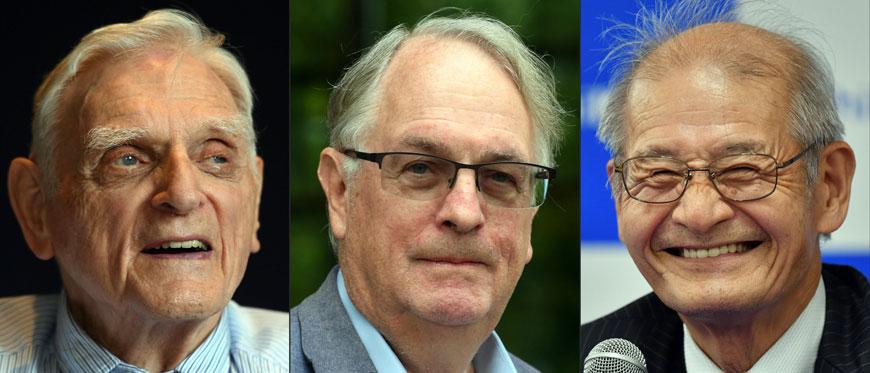You are here
Pioneers of lithium-ion battery win Nobel Chemistry Prize
By AFP - Oct 10,2019 - Last updated at Oct 10,2019

This combination of photos created on Wednesday shows (from left to right) American professor and solid-state physicist, John Goodenough, during a press conference at The Royal Society in London, British Professor Stanley Whittingham posing in Ulm, southern Germany, and Japanese chemist Akira Yoshino speaking to media Tokyo (AFP photo)
STOCKHOLM — Three researchers won the Nobel Chemistry Prize on Wednesday for the development of lithium-ion batteries, paving the way for smartphones and a fossil fuel-free society.
John Goodenough of the United States — at 97 the oldest person to be awarded a Nobel prize — Britain’s Stanley Whittingham, and Japan’s Akira Yoshino will share the 9 million Swedish kronor (about $914,000 or 833,000 euros) prize equally, the Royal Swedish Academy of Sciences said.
“This lightweight, rechargeable and powerful battery is now used in everything from mobile phones to laptops and electric vehicles... [and] can also store significant amounts of energy from solar and wind power, making possible a fossil fuel-free society,” the jury said.
“Lithium batteries have revolutionised our lives since they first entered the market in 1991,” and were “of the greatest benefit to humankind”.
Seeking an alternative source of power during the oil crisis of the 1970s, Whittingham discovered a way to harness the potential energy in lithium, a metal so light it floats on water.
He constructed a battery partly made of lithium that utilised the element’s natural tendency to shed electrons, thereby transferring energy.
However, the battery was too unstable to be used.
Goodenough built on Whittingham’s prototype, substituting a different metal compound and doubling the potential energy of the battery to four volts.
This paved the way for far more powerful and durable batteries in the future.
In 1985, Yoshino instead used a carbon-based material that stores lithium ions, finally rendering the battery commercially viable.
The culmination of the trio’s research resulted in the most powerful, lightweight and rechargeable battery ever seen.
Good scientists ‘
stay persistent’
“This is such a wonderful thing, and I am very surprised,” Yoshino told reporters in Tokyo after winning the prize.
He said he had only gotten a cell phone in recent years.
“I have long felt a bit of rejection towards mobile phones, so I have never had one until recently.
“I know the lithium ion battery really benefitted mobile phones,” he said, adding he did “not really” feel that he had helped make a product that benefitted his life.
For Yoshino, a good scientist needed two qualities.
“One thing is that you have to have a flexible brain. Flexibility. The other is tenacity. You stay persistent and never give up.”
Whittingham, 77, said he was “overcome with gratitude at receiving this award”.
His research “has helped advance how we store and use energy at a foundational level, and it is my hope that this recognition will help to shine a much-needed light on the [US] nation’s energy future”, he said on the website of Binghamton University in New York where he is a professor.
Yoshino, 71, works at the Asahi Kasei Corporation in Tokyo and is a professor at Meijo University in Nagoya, Japan, while Goodenough holds the Cockrell Chair in Engineering at the University of Texas at Austin.
The trio will receive the prize from King Carl XVI Gustaf at a formal ceremony in Stockholm on December 10, the anniversary of the 1896 death of scientist Alfred Nobel who created the prizes in his last will and testament.
Last year, the honour went to US scientists Frances Arnold and George Smith and British researcher Gregory Winter for developing enzymes used for greener and safer chemistry and antibody drugs with fewer side effects.
Arnold was just the fifth woman to clinch chemistry’s most prestigious honour since Marie Curie in 1911.
This year’s Nobel season kicked off on Monday with the Medicine Prize, followed by the Physics Prize on Tuesday.
Peace prize on Friday
The Literature Prize will follow on Thursday, with two laureates to be crowned after a sexual harassment scandal forced the Swedish Academy to postpone the 2018 award, for the first time in 70 years.
Names creating a buzz ahead of this year’s literature prize include Canadian poet Anne Carson, Kenyan writer Ngugi Wa Thiong’o, Romanian poet and novelist Mircea Cartarescu and Polish writer and activist Olga Tokarczuk.
On Friday the action moves to Norway where the Peace Prize is awarded, with bookies predicting a win for Swedish teen climate activist Greta Thunberg.
The Economics Prize will wrap up the Nobel prize season on Monday, October 14.
Related Articles
OSLO/STOCKHOLM — The announcement of the Nobel Medicine Prize on Monday opens an unusual 2019 Nobel season in which two literature laureates
TOYOTA CITY, Japan — Engineers at Toyota Motor Corp.
AMMAN — For the first time a Jordanian scientist, Shaher Momani, has been nominated for the Nobel Prize in physics for 2016.Momani, a profes













